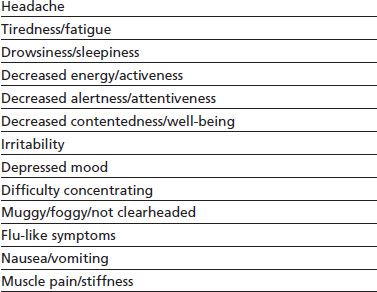There are 4 caffeine related disorders (1) intoxication (2) withdrawal (3) anxiety and (4) sleep
Excessive caffeine intake can lead to a mild physical dependence. Caffeine addiction has yet to be documented in humans. Just one cup of coffee a day or 100 mg of caffeine a day can lead to a physical dependence that triggers withdrawal symptoms. These symptoms include headaches, muscle pain and stiffness, lethargy, nausea, vomiting, depression and irritability.
Withdrawal symptoms can show up as early as 12 to 24 hours after stopping caffeine intake and could last as long as 9 days. Constant caffeine intake increases tolerance and will increase the withdrawal symptoms of caffeine as body will be more sensitive to side effects of adenosine.
Most individuals over the age of 18 living in the United States use some form of caffeine. Coffee, soda, energy drinks and chocolate When one suddenly drinking less coffee than usual they may experience tiredness, headaches, insomnia and other symptoms. The act of needing caffeine is more of a dependency than an addiction.
Three cups of coffee or 300 milligrams is considered a moderate amount and normally causes no harm to the body of healthy adults. When taking at high levels, around 750 milligrams a day caffeine may increase calcium and magnesium loss in urine. Recent studies have shared that caffeine does not increase risk of bone loss when enough calcium is taken in. For every cup of coffee you drink add 2 Tbsps of milk this will help offset the calcium lost.
The March of Dimes does not recommend more than 200 milligrams of caffeine a day. While no studies show a link between low amounts of caffeine (a cup of coffee a day) and
- trouble conceiving
- miscarriage
- birth defects
- premature birth
- low birth rate
the March of Dimes based their decision on limited studies, where women consumed higher amounts of caffeine and the risk of miscarriage increased
It is recommended that children stay away from caffeine. Most caffeine sources kids use include energy drinks, sweet tea and soda pop. This means that in addition to caffeine possibly hurting them the sweet drinks may lead to obesity as well.
With all the negativity about caffeine it may be thought that there is no good sources. However this would not be right Caffeine has a potential to improve alertness, concentration, energy, clear headedness and sociability. Headache pain and asthma can also be helped by caffeine. More research is needed but it is thought that it may help reduce risk of :
- Parkinson's disease
- liver disease
- colorectal cancer
- type 2 diabetes
- dementia
The potential benefits still have to be studied to measure adverse effects with benefits.




No comments:
Post a Comment
I love comments so if you have a minute leave me your thoughts on the above post